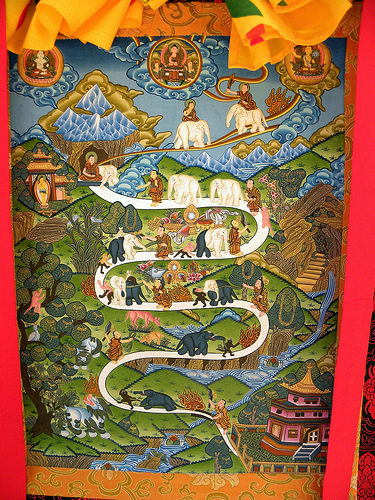I do not feel obliged to believe that the same God
who has endowed us with sense, reason, and intellect
has intended us to forgo their use.” -Galileo Galilei
Hello, earthlings! We’re back!
Religion against science, science against religion; which one is right? It’s an old, hoary story, one that goes far back past the books of Christopher Dawkins to the well-known tales of Galileo, Hypatia and Socrates. Devotees of science say that the ordered world precludes a belief in God, while the faithful say the very same proof explains it.
We’re still having this conversation, on the same kind of cultural scale. You can visit the Creation Museum in Petersburg, KY, where you can see a real, world-class allosaurus fragilis skeleton and then learn that the animal in question existed at the same time as human beings and died in the Flood. You can head to your local streaming service and rent Bill Maher’s film “Religulous,” which tries to put the screw to who people who truly believe in the power of prayer without trying to understand why they might be so devoted.

Maher at the Mount of Olives, destroying sacred cows or something.
This conversation, unfortunately, has no room for men like Vatican astronomer Guy Consolmagno, an actual scientist who is also a Jesuit brother. (He’s so cool we’re going to devote an entire article to his work. Stay tuned.)
Nope. The rest of us are still fighting over who’s right and who’s wrong. Who knows? It’s my opinion that we’re just adding to the fighting that’s been happening since some nameless, curious shaman discovered fire and thought it might be a gift from the gods and not just a natural reaction, not making progress. We’ll never know. All we can do is keep talking and trying to understand each other.
Nancy Kress’s “Belief,” in the March/April issues of Fantasy & Science Fiction, tackles this dichotomy on a very personal level. There is a mother devoted to the path of science; there is a teen daughter who is looking for something a little more transcendental. What I love a lot about this story is the fact that Kress allows the readers to explore both viewpoints in a parallel fashion and draw their own conclusions. And Kress’s protagonists, unlike the Mahers and the Fox News anchors of the world, actually make progress.
In an interview with The Magazine of Fantasy & Science Fiction, Kress explains that “neither the rigors of the scientific method—which in some quarters is taken pretty much as a religion—nor the ‘squishiness’ of faith are completely satisfactory. ‘Belief’ is my personal way of simultaneously criticizing both–while leaving the door open to both. Talk about squishy!”
We here at Sacred Earthlings call it awesome reading.

This is wrong no matter which side of the argument you’re on.
Let’s all keep trying to understand each other — without shouting each other down, denouncing faith or science with a broad brush or as a matter of course. As Kress’ heroines may (or may not! No spoilers!) discover, there’s only one way out of this mess we’ve made, and that’s together.















